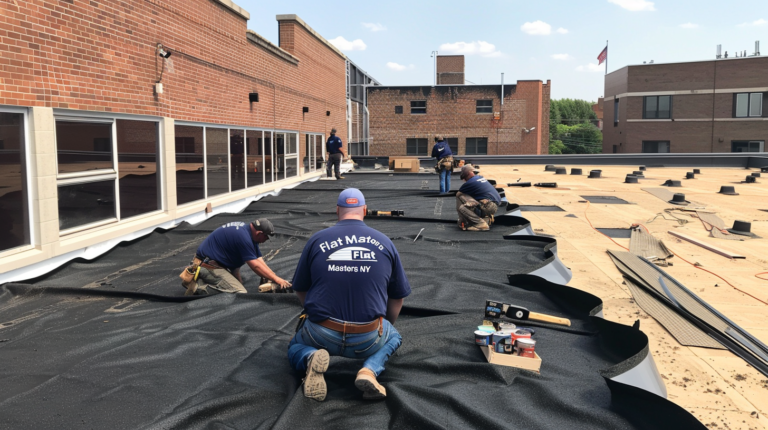How to Fix Flat Roof Leaks: 5 Expert Methods That Actually Work
Look, I've been fixing leaking flat roofs across Queens for over two decades, and I can tell you right now that most "quick fixes" you'll find online are garbage. When someone calls Flat Masters NY with water dripping through their ceiling, they need real solutions, not duct tape and prayers.
Here's the thing about flat roof leaks - they're sneaky. That water stain on your ceiling? The actual leak could be 15 feet away from where you see the damage. Water travels along the roof deck before it finds a way down into your building.
Method 1: Emergency Patch with Roofing Cement
When you've got water pouring in and need to fix a leaking flat roof immediately, roofing cement is your best friend. I keep buckets of this stuff in my truck because it works fast.
First, you need to find the actual leak source. Don't just patch where you see water inside - that's amateur hour. Get up on the roof (safely, please) and look for obvious damage: cracks, holes, or areas where the membrane is pulled away from the substrate.
Clean the area completely. I mean completely - no shortcuts here. Sweep away all debris, dirt, and loose material. If there's standing water, you'll need to remove that too or the patch won't adhere properly.
Apply the roofing cement in a generous layer, extending at least 6 inches beyond the damaged area in all directions. And here's something most people mess up - you need to feather the edges so water doesn't catch on them later.
Method 2: Membrane Repair with Reinforcement Fabric
This is where we get into proper professional territory for fixing a leaking flat roof. When the damage is more extensive than a simple crack, you need reinforcement fabric embedded in the repair.
I use fiberglass mesh for most repairs, though polyester fabric works too. Cut your fabric to overlap the damaged area by at least 4 inches on all sides. Apply a base coat of roofing cement, embed the fabric, then apply another coat over the top.
The key is working in thin layers. Don't glob it on thick - multiple thin coats will last longer than one thick mess. Each coat needs to cure before you apply the next one.
Last month on Northern Boulevard, we had a commercial building where the previous contractor tried to fix a leak with just cement - no reinforcement. Three months later, it was leaking again because thermal movement cracked the repair. Don't make that mistake.
Method 3: EPDM Rubber Patch Application
For EPDM membrane roofs, you can't just slap cement on there and call it done. EPDM requires specific repair techniques if you want the fix to last.
Clean the area with EPDM primer - this stuff is crucial for adhesion. Cut your patch material from the same type of EPDM, making it large enough to overlap the damage by at least 3 inches all around.
Apply EPDM adhesive to both surfaces and let it get tacky - usually about 5-10 minutes depending on temperature and humidity. Press the patch down firmly, working from the center outward to eliminate air bubbles.
Seal the edges with lap sealant. This is non-negotiable - EPDM patches without proper edge sealing will fail when the membrane expands and contracts with temperature changes.
Method 4: Modified Bitumen Torch-Down Repair
Now we're getting into serious repair territory. How to fix a flat roof leak on modified bitumen systems requires heat application, so this isn't a DIY job unless you really know what you're doing.
Cut out the damaged section in a square or rectangular shape - no irregular cuts. The repair piece should overlap by at least 6 inches on all sides. This seems excessive to homeowners, but trust me, it's necessary for a permanent fix.
Clean the substrate thoroughly and apply primer if you're going down to the deck. The torch work needs to be precise - too little heat and the material won't adhere, too much and you'll damage surrounding membrane or even start a fire.
I've seen contractors rush this process and end up with repairs that look good initially but fail within a year. The key is getting the modified bitumen to flow just enough to create a proper bond without overheating.
Method 5: Liquid Applied Membrane Systems
This is my go-to method for fixing leaking flat roofs when the damage is widespread or when traditional patching just won't cut it. Liquid membranes can cover complex shapes and provide seamless protection.
Prepare the surface by cleaning and priming according to manufacturer specs. Apply the base coat at the recommended thickness - usually around 20-30 mils wet. Embed reinforcement fabric in high-stress areas like penetrations and roof edges.
The top coat goes on after the base coat has cured. Don't rush this - proper cure time is essential for performance. I've had customers try to speed things up with fans or heaters, and it always backfires.
These systems are excellent for how to fix a flat roof that leaks around complex penetrations like HVAC units or skylights. The liquid flows into all the nooks and crannies that traditional materials can't reach effectively.
When Professional Help is Non-Negotiable
Look, I appreciate the DIY spirit, but some situations require professional intervention. Structural damage, extensive membrane failure, or leaks around major mechanical equipment aren't weekend projects.
Here in Queens, we deal with freeze-thaw cycles that can turn small problems into big ones fast. What looks like a simple patch job in July might reveal significant substrate damage when we really dig into it.
At Flat Masters NY, we see a lot of "fixed" roofs that were actually made worse by improper repairs. Using the wrong materials or techniques can void warranties and create bigger problems down the line.
Prevention: The Real Solution
The best way to fix flat roof leaks is to prevent them in the first place. Regular inspections, proper drainage maintenance, and prompt attention to minor issues will save you thousands in emergency repairs.
Clear those drains and gutters regularly - standing water is the enemy of any flat roof system. Check flashing around penetrations twice a year, especially after severe weather.
And here's something most people don't think about: foot traffic damages flat roofs over time. If you need regular access for maintenance, install proper walkways. Don't just tromp across the membrane in work boots.
The salt air here in Queens is particularly hard on roofing materials, so what works inland might not hold up near the water. We've learned to adjust our repair techniques and material choices based on proximity to the East River and Long Island Sound.
Bottom line - small repairs done right will last for years. Small repairs done wrong turn into emergency calls on the worst weather days. If you're not confident in your repair skills, call professionals like us at Flat Masters NY. We've seen every type of leak Queens can throw at us, and we know how to fix them permanently.


